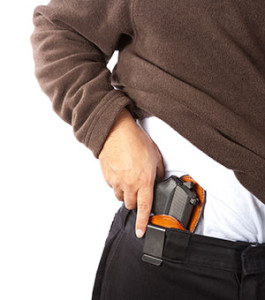If you own a bricks-and-mortar firearms retail store, at some point you will have to deal with this question, if you haven't already. There are both pros and cons to having your employees carry in your store while they're on the clock, so let's look at the list of them.
Cons
There are a number of questions you should be asking before allowing your staff to carry while working—and a "No" to any of them should give you pause.
Do my employees have an acceptable level of training to use a firearm in a life-threatening situation should the need arise? Do they even know how to discern which situations call for the potential use of deadly force and which ones require less-lethal remedies?
Is the potential for the use of deadly force realistic for your store design? In many jurisdictions, law enforcement trains to a "21-foot rule" to determine when deadly force can be an option, this being the distance needed for an officer to effectively draw a weapon and fire when confronted. Inside your store, though, the reaction space may be more like three feet across the gun counter. Knowing that, does allowing your staff to carry become more of a liability—are they more prone to a gun grab, for instance, or will they simply not have the time and distance needed to draw and fire in a close-quarters attack—than an asset?
Do my business and health insurance policies cover any and all aftermath resulting from a use of force by an employee?
Are there any local, state or federal laws that prevent my employees from carrying their personal firearms while at work or restrictions to carrying while working that would hurt my business?
Do your employees need concealed carry permits to carry legally in your store? Does your store need any kind of special security licensing to permit your employees to work while armed?
Are your employees trained in first aid?
Are you in a high-crime area? If so, is your area one where crimes occur with some frequency when businesses are open?
Is your business located remotely or is challenging for law enforcement to get to in a timely manner?
There's another concern you should address, and that is the one having to do with the impression that having a staff of armed employees makes on your customers.
"I worked in a firearms retail store and indoor shooting range in the D.C.-metro area for many years back in the 1990s," Jennifer Pearsall, the National Shooting Sports Foundation (NSSF) director of public relations, told me. "For many years the county our store resided in refused to sign off on concealed carry permits, but when some state legislation made the application process more universal, naturally everyone wanted to carry. That was certainly true for several of our employees, especially since our store had been burglarized a couple times, though always after hours. But the owner decided not to allow it. We had a customer base consisting of everyone from serious antique collectors to competitive pistol shooters and hunters, but we also regularly had novices in the store. The owner didn't want to give those newcomers and those quieter collectors we often had in the store an impression that was in any way intimidating or unapproachable. That's a legitimate consideration, emphasis on 'consideration.' What's normal to us as professionals in the industry isn't always normal to those on the outside—you do have to put yourself in your customers' shoes and ask, 'What would I think if this was my first time walking through my store's door?' Too, a store that has an extremely active 3-Gun competitor or cowboy action shooting crowd might make a different decision about in-store carry than one that routinely fills their first-time shooter safety classes. There is no right or wrong answer to this beyond the one you come up with yourself based on what you know about your customer base as it exists now and how you want to expand that base."
Pros
Many of the pros to allowing your employees to carry while at work should be obvious, but let's take a look at some of them in greater detail. Some of these are predicated on your having a policy regarding their ability to carry in your store, while others address a "Yes" response to an item in the "con" list above.
Your employees have some level of training in self-defense and are active participants in the shooting sports outside of work. These things can certainly help make them better salespeople.
Your employees have been educated about the laws of open and concealed carry in your state and can help pass that information on to customers seeking the same.
If you had to obtain special licensing or institute a training program to enable your employees to carry during work, this might reduce your risk of liability to your insurance carrier.
Having your employees carry during open business hours, especially open carry, is a visual deterrent to criminals.
Employee carry can serve as an advantage for stores located in remote areas and far away from emergency responders.
When presented as "normal" and "not a big deal," open carry by your staff could help mitigate apprehension in customers new to your store and open the door for discussion on subjects like the legality of concealed carry in your area, what kind of gun and holster to buy and other subjects that will interest these novice gun owners.
By putting all the precursors in place to allowing your employees to carry—their training, store carry policy and any necessary licensing, discussions with your insurance carriers and lawyer—you are better equipped to deal with a deadly force situation if one does occur. This includes everything from first aid and working with law enforcement arriving on the scene to handling the media, counseling and any workman's comp claims for employees, insurance claims and any matters that need to be handled by a court.
Only you can decide what's right for your store when it comes to allowing your employees to carry while they're working. Whatever decision you make, simply by working through the lists of pros and cons here and adding in any other factors that could affect your store and livelihood, you've improved how you do business.
As they say, work smarter, not harder.
This article was originally published on NSSF.






